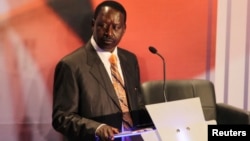NAIROBI, KENYA —
In Kenya, political coalitions usually are formed on the basis of tribal alliance and who can get the most votes from their base. With next week's presidential vote looking to be a close contest, though, minority tribes have a bigger role to play.
The latest public-opinion poll shows Prime Minister Raila Odinga running neck-and-neck with Uhuru Kenyatta in the presidential race. Political observers estimate the tribes of the two men and their running mates account for about 10 million of Kenya's 14 million registered voters.
Political analyst Adam Oloo, a lecturer at the University of Nairobi, said Odinga's CORD coalition and Kenyatta's Jubilee coalition are tribal-based, but minority tribes are likely to go with the one that has a national image.
“Going into 2013 election, you will find that Jubilee has been painted as what you can call dominated by two tribes, basically Kikuyu and Kalenjin, and therefore CORD is trying to say that 'We are the national face,' and therefore under that circumstance you find that nearly 10 smaller parties joined it,” said Oloo.
Key Somali region
The latest survey suggests out of three counties in the predominantly Somali region in the north, two will vote for CORD.
Oloo notes minority tribes feel their vote will not bring much change if they vote for a candidate who has a support of more than one big tribe.
“What they look at is who will care about our board, and they look at it if there is electing around two big tribes, for example the way Jubilee has two big tribes, then they feel that their vote will not count there... but when they look at CORD which is trying to pick a few here, a few there and trying to appeal to the conscience across the breath of the country, then they feel that their interests might be well addressed under CORD than Jubilee,” said Oloo.
Kenyatta and his running mate, parliament member William Ruto, both are charged with crimes committed during inter-tribal fighting that erupted following the last disputed election in 2007.
Impact of charges
The opinion poll shows that 35 percent of voters believe Kenyatta will not be able to govern the country well because of pending cases of the International Criminal Court. Diplomats have warned of possible political and financial consequences if the two ICC suspects are elected next week.
Adan Mohamed is a businessman in Eastleigh, a predominantly ethnic-Somali part of Nairobi. He said he will not vote for a leader he knows will have consequences on his business.
“As a businessman I would not like to be involved in anything that I know is going to bring problem to my business, like politics. I would not like to elect someone, for example the two ICC suspects, if the country faces sanction that is going to affect me and my business. I would not want to elect such a person,” said Mohamed.
After months of crisscrossing the country, the presidential campaigns are scheduled to end March 2, two days before the election.
The latest public-opinion poll shows Prime Minister Raila Odinga running neck-and-neck with Uhuru Kenyatta in the presidential race. Political observers estimate the tribes of the two men and their running mates account for about 10 million of Kenya's 14 million registered voters.
Political analyst Adam Oloo, a lecturer at the University of Nairobi, said Odinga's CORD coalition and Kenyatta's Jubilee coalition are tribal-based, but minority tribes are likely to go with the one that has a national image.
“Going into 2013 election, you will find that Jubilee has been painted as what you can call dominated by two tribes, basically Kikuyu and Kalenjin, and therefore CORD is trying to say that 'We are the national face,' and therefore under that circumstance you find that nearly 10 smaller parties joined it,” said Oloo.
Key Somali region
The latest survey suggests out of three counties in the predominantly Somali region in the north, two will vote for CORD.
Oloo notes minority tribes feel their vote will not bring much change if they vote for a candidate who has a support of more than one big tribe.
“What they look at is who will care about our board, and they look at it if there is electing around two big tribes, for example the way Jubilee has two big tribes, then they feel that their vote will not count there... but when they look at CORD which is trying to pick a few here, a few there and trying to appeal to the conscience across the breath of the country, then they feel that their interests might be well addressed under CORD than Jubilee,” said Oloo.
Kenyatta and his running mate, parliament member William Ruto, both are charged with crimes committed during inter-tribal fighting that erupted following the last disputed election in 2007.
Impact of charges
The opinion poll shows that 35 percent of voters believe Kenyatta will not be able to govern the country well because of pending cases of the International Criminal Court. Diplomats have warned of possible political and financial consequences if the two ICC suspects are elected next week.
Adan Mohamed is a businessman in Eastleigh, a predominantly ethnic-Somali part of Nairobi. He said he will not vote for a leader he knows will have consequences on his business.
“As a businessman I would not like to be involved in anything that I know is going to bring problem to my business, like politics. I would not like to elect someone, for example the two ICC suspects, if the country faces sanction that is going to affect me and my business. I would not want to elect such a person,” said Mohamed.
After months of crisscrossing the country, the presidential campaigns are scheduled to end March 2, two days before the election.




